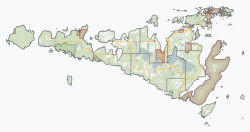Assiginack
Assiginack | |
|---|---|
| Township of Assiginack | |
 The SS Norisle at the Manitowaning Heritage Complex | |
| Coordinates: 45°44′N 81°48′W / 45.733°N 81.800°W | |
| Country | Canada |
| Province | Ontario |
| District | Manitoulin |
| Government | |
| • Type | Township |
| • Mayor | Brenda Reid |
| • MP | Carol Hughes (NDP) |
| • MPP | Michael Mantha (NDP) |
| Area | |
| • Land | 226.72 km2 (87.54 sq mi) |
| Population (2016)[2] | |
• Total | 1,013 |
| • Density | 4.5/km2 (12/sq mi) |
| Time zone | UTC-5 (EST) |
| • Summer (DST) | UTC-4 (EDT) |
| Postal code FSA | P0P |
| Area code | 705 / 249 |
| Website | www |
Assiginack (/əˈsɪɡɪnæk/)[3] is a township in the Canadian province of Ontario, located on Manitoulin Island. An Ontario Historical Plaque was built on the grounds of the Assiginack Museum by the province to commemorate the Manitoulin Treaties' role in Ontario's heritage.[4]
Communities
[edit]The principal community in the township is Manitowaning. Smaller communities in the township include Bass Creek, Bidwell, Clover Valley, Eagles Nest, Hilly Grove, The Slash, Squirrel Town and Vanzant's Point.
Manitowaning
[edit]Manitowaning is the administrative centre of Assiginack township. The town was founded in 1836 as a centre of the island's Aboriginal education.[5] Manitowaning Bay is a natural harbour, and the community has a marina with good docking facilities. From its early history, Manitowaning was a regular port of call for schooners and steamboats from many points on the Great Lakes. Manitowaning was the first and last scheduled stop on Manitoulin Island for the ships of the Owen Sound Transportation Company Limited. The old steamboat wharf is now part of the community's Museum Heritage Complex, home of the SS Norisle. The town is home to the De-ba-jeh-mu-jig Creation Centre. Cardwell Street in Manitowaning continues east of the community, becoming the primary access road to the Wiikwemkoong Unceded Reserve.
Demographics
[edit]In the 2021 Census of Population conducted by Statistics Canada, Assiginack had a population of 1,008 living in 447 of its 710 total private dwellings, a change of -0.5% from its 2016 population of 1,013. With a land area of 224.89 km2 (86.83 sq mi), it had a population density of 4.5/km2 (11.6/sq mi) in 2021.[6]
| 2021 | 2016 | 2011 | |
|---|---|---|---|
| Population | 1,008 (-0.5% from 2016) | 1,013 (+5.5% from 2011) | 960 (+5.0% from 2006) |
| Land area | 224.89 km2 (86.83 sq mi) | 226.72 km2 (87.54 sq mi) | 227.87 km2 (87.98 sq mi) |
| Population density | 4.5/km2 (12/sq mi) | 4.5/km2 (12/sq mi) | 4.2/km2 (11/sq mi) |
| Median age | 53.6 (M: 53.2, F: 54.0) | 50.3 (M: 50.1, F: 50.5) | |
| Private dwellings | 710 (total) 447 (occupied) | 730 (total) | 707 (total) |
| Median household income | $73,500 | $63,189 |
| Year | Pop. | ±% |
|---|---|---|
| 2001 | 931 | — |
| 2006 | 914 | −1.8% |
| 2011 | 960 | +5.0% |
| 2016 | 1,013 | +5.5% |
| [11][1][2] | ||
See also
[edit]References
[edit]- ^ a b c "2011 Community Profiles". 2011 Canadian census. Statistics Canada. March 21, 2019. Retrieved 2012-02-24.
- ^ a b "Census Profile, 2016 Census: Assiginack, Township". Statistics Canada. 8 February 2017. Retrieved June 20, 2019.
- ^ The Canadian Press (2017), The Canadian Press Stylebook (18th ed.), Toronto: The Canadian Press
- ^ Ontario Plaque Archived 2013-12-02 at the Wayback Machine
- ^ "Manitowaning". Manitoulin Tourism. Retrieved February 1, 2019.
- ^ "Population and dwelling counts: Canada, provinces and territories, census divisions and census subdivisions (municipalities), Ontario". Statistics Canada. February 9, 2022. Retrieved April 2, 2022.
- ^ "2021 Community Profiles". 2021 Canadian census. Statistics Canada. February 4, 2022. Retrieved 2023-10-19.
- ^ "2016 Community Profiles". 2016 Canadian census. Statistics Canada. August 12, 2021. Retrieved 2019-06-20.
- ^ "2006 Community Profiles". 2006 Canadian census. Statistics Canada. August 20, 2019.
- ^ "2001 Community Profiles". 2001 Canadian census. Statistics Canada. July 18, 2021.
- ^ Statistics Canada: 2001, 2006 census


